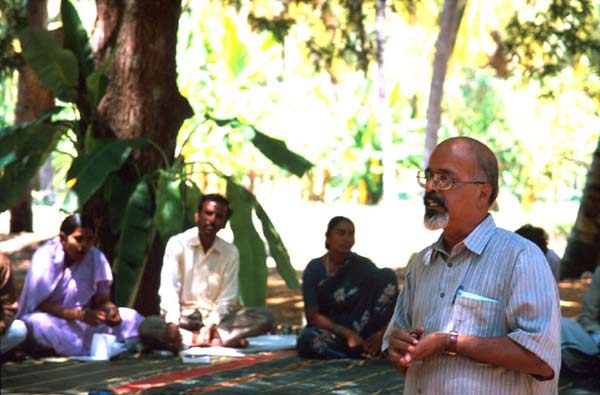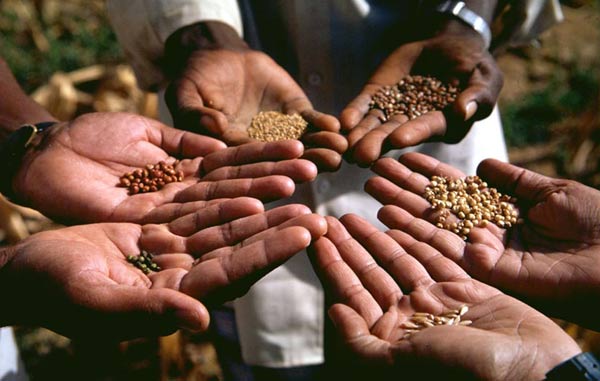 |
AUDIO and BOOKS "If anyone tells you that
GM is going to feed the world, tell them that it is not..."
|
 |
AUDIO and BOOKS "If anyone tells you that
GM is going to feed the world, tell them that it is not..."
|
NEW - download (as a pdf file) the Five Year Freeze's excellent new
report (October 2002)
'Feeding
or Fooling the World - Can GM really feed the hungry?'
|
click on the link to download the recording made during a farm tour in Norfolk, UK, in April 2001
The people interviewed are:
The message they
brought is that GM crops are not wanted nor needed to provide varied and
plentiful food.
Producer: Andrew Wood, Undercurrents |
ARTICLES
Feeding
the world? by Jules Pretty
An important analysis, by the Director
of the Centre for Environment and Society at the University of Essex, of
the biotech industry's claims to be global benefactors. Includes fascinating
examples of the remarkable success of sustainable approaches to improving
agriculture in both the developing and developed worlds. Article
first published in SPLICE, Vol 4 Issue 6
"Better
dead than GM fed?" by GRAIN
There's a food aid crisis. The US says
it's impossible to provide GM-free food aid to Southern Africa and that
the people there must accept GM grain or starve. But non-GM grain is available
in the US - more than 50% of US grain elevators can and do segregate GM
and non-GM grains. The US position is one of choice, not necessity, and
this article shows how it forms part of a strategy to exploit food aid
for commercial gain.
Published in
SEEDLING,
OCTOBER 2002
QUOTES
ON THE FOOD AID CRISIS
The Bush Administration is exploiting famine in Africa
in an effort to support America's biotech industry. It's just the latest
twist in a long and cynical marketing campaign.
Indian
farmers judge GM crops by
Hugh Warwick
Seldom are the people the biotech industry
claim to be helping actually consulted. This fascinating article describes
a project initiated by ActionAid involving a jury of Indian farmers whose
very livelihoods depend on what they grow
Published in
THE
ECOLOGIST, September/October 2000

photo from the collection of Hugh Warwick <hedgehog@gn.apc.org>
The
Golden Backlash by Hugh
Warwick
An incisive article on the cynical use
of "golden rice" as a PR fix for an otherwise beleaguered biotech industry.
As well as analysing the motivation behind the initiative, the article
also considers the biological problems as well as alternative approaches.
Published in
SPLICE,
March/April 2000
THERE'S
NOTHING LIKE A FEEL GOOD BOWL OF GOLDEN RICE by
Naomi Klein
An excellent introductory press article
on the context in which this GM food is being promoted
Published in
Globe
and Mail Canada, August 2000
GENETIC
ENGINEERING: Can it feed the world? by
Dr Sue Mayer
This briefing examines the claims that
GM foods are necessary to feed the world.
Published as
GeneWatch
Briefing Number 3
THE
NEXT GENERATION OF GM FOODS: Good for whose health? by
Dr Sue Mayer
This briefing examines GM foods said to
be nutritionally good for the developing and the developed world.
Published as
GeneWatch
Briefing Number 10
LINKS TO OTHER ARTICLES
Biotechnology
and genetically modified organisms
Christian Aid briefing
Selling
Suicide farming, false promises and genetic engineering in developing countries
Christian Aid's comprehensive report
GM
could 'impoverish poor farmers'
BBC report on ActionAid's concerns about GM crops
'Feeding
or Fooling the World - Can GM really feed the hungry?'
The Five Year Freeze's excellent new report (October 2002) -
download (as a pdf file)
Biotechnology:
Not the answer to hunger
Article by Devinder Sharma
Africa’s
Tragedy - Famine as commerce
Article by Devinder Sharma
Biotechnology:
Exploiting the Poor and Hungry
Speech by Devinder Sharma
National Convention on Biotechnology and Hunger, Hyderabad, India
"Green
Revolution turns sour"
Devinder Sharma in New Scientist
Bt
cotton will kill farmers, financially and literally
Devinder Sharma interviewed on India's GM cotton fiasco
South
Africa - Bishops call for moratorium on GM Food
News article
PHILIPPINES: CATHOLIC CHURCH FIGHTS GM CROP
THE GOLDEN
RICE HOAX - When Public Relations replaces Science
Article by Dr. Vandana Shiva
UK
Dumped 'BSE' cattle feed on Third World
Not GMOs but relevant
Biotech
has bamboozled us all
George Monbiot on how studies show traditional farming methods
are best for feeding the world
Includes details of a major study by Chinese scientists published in
Nature,
reporting the results
of one of the biggest agricultural experiments ever conducted.
The
potential of organic and biotechnology cropping methods to feed the world
E. Ann Clark, professor of plant agriculture at the University
of Guelph in Ontario, presented the following
speech at the annual meeting of the American Society of Agronomy in
Charlotte, North Carolina
Promise
And Pitfalls Of Using Genetically Modified Crops In Developing Countries
Transcript of an excellent hour long debate featuring Dr. Peter
Rosset and Dr. Per Pinstrup-Andersen
Ten
reasons why biotechnology will not ensure food security, protect
the
environment and reduce poverty in the developing world
Miguel Altieri and Peter Rosset. AgBioForum, 2(3&4),
155-162.
See also Altieri and Rosset's response
to McGloughlin
UNDP
challenged on Genetic Engineering
Peter Rosset on Genetic Engineering of Food Crops for the Third
World:
An Appropriate Response to Poverty, Hunger and Lagging
Productivity?
ISAAA
in Asia -- Promoting Corporate Profit in the Name of the Poor
GRAIN briefing
Engineering
Solutions to Malnutrition
Briefing from GRAIN on moves to genetically engineer pro-vitamin
A into rice and other crops.
Looks at limitations of this approach, who controls the technology,
and alternative strategies
On
using Southern scientists to make Europeans feel guilty for not supporting
GE
Joint letter organised by Dr. Tewolde Gebre Egziaber, in protest
at Channel Four's Equinox TV programme and a Times article
Getting your science from charlatans
Items on the making of the pro GM-to-feed-the-world Equinox
TV science programme
How the NUFFIELD report was fixed
Vested interests on the Nuffield panel + articles on the pro-GM report
Feeding
the Hunger Machine
George Monbiot on the Nuffield
Council and the most asinine biotechnology report ever written
Lessons
from the Green Revolution: Do We Need New Technology to End Hunger?
Article by Peter Rosset, Joseph Collins, and Frances Moore Lappé
Biotechnology
not the answer to global hunger
Article by Deborah Toler
Hi-tech
crops are bad for the brain
"Miracle" crops, hailed as the answer to global famine, are contributing
to widespread brain
impairment in the developing world, a new report concludes. Not GMOs
but relevant to debate
Why
Genetically Altered Food Won't Conquer Hunger
Peter Rosset, short article in New York Times
GOLDEN RICE? GENETIC ENGINEERING IS NO RESPONSE
TO WORLD HUNGER
Greenpeace briefing
Are
GMOs essential for effective sustainable agriculture in a hungry world?
Mark Griffiths' article
International
Rice Research Institute's first transgenic field test
Briefing from GRAIN in the context of moves to introduce GM
rice in Asia
Functional
foods: good for Monsanto's health
Briefing from Corporate Watch on 'functional foods', 'golden
rice' etc
"Poverty
and Globalisation'
Vandana Shiva's Reith lecture with many references to GMO related
issues
HUNGRY
FOR POWER
Download pdf of UK Food Group report on the impact
of TNCs on food security
GE
Rice: ASIAN FARMERS HAVE EVERYTHING TO LOSE
Article from Masipag - sustainable agriculture network in the
Philippines
Biotech,
Poverty, Hunger & Developing Nations
Worldwatch Institute's testimony to the US Senate
GM crops
will NOT solve world hunger say scientists
Scientists and Physicians for the Responsible Application of Science
and Technology
Food?
Health? Hope? -- Genetic Engineering and World Hunger
CornerHouse Briefing No 10, October 1998: by Sarah Sexton, Nicholas
Hildyard and Larry Lohmann
GREED
OR NEED? Genetically modified crops
Panos Media Briefing No 30A (re-issue) February 1999
Bioethics:
A Third World Issue
Dr. Vandana Shiva
Clear-Cutting
the Last Wilderness: Compromising the genomes of our major crops
Wes Jackson article in The Land Report, a publication of The Land Institute
Whose
agenda? The corporate takeover of corn in SE Asia
A report researched by BIOTHAI, GRAIN, MASIPAG and PAN
Indonesia
The
Biosafety Protocol - controlling trade in GMOs
Christian Aid and World Development Movement briefing
BOOKS
Lappé, F.M., Collins, J., Rosset, P., and Esparza, L. (1998). World hunger: Twelve myths (2nd ed.). New York: Grove Press and Earthscan.
Pretty, J. (1995). Regenerating agriculture. London: Earthscan.

Seeds of Hope (March 2000)
Indian farmers from the southern stae of Karnataka showing
the diversity of seed that their arid land can generate.
From bottom left, going clockwise: mung (green gram);
red gram; millet; horse gram; sorghum; wheat.
(photo from the collection of Hugh Warwick
<hedgehog@gn.apc.org>)
"We strongly object that the image of the poor and hungry from our countries
is being used by giant multinational corporations to push a technology
that is neither safe, environmentally friendly, nor economically beneficial
to us."
Part of a statment by delegates from 22 African countries to the
UN Food and Agriculture Organisation
on the subject of GE in food and farming
"Biotechnology and GM crops are taking us down a dangerous road, creating
the classic conditions for hunger, poverty and even famine. Ownership and
control concentrated in too few hands and a food supply based on too few
varieties of crops planted widely are the worst option for food security."
Christian Aid report: "Biotechnology
and GMOs"
"I'm against the theory of the multinational corporations who say if
you are against hunger you must be for GMO. That's wrong, there is plenty
of
natural, normal good food in the world to nourish the double of humanity.
There is absolutely no justification to produce genetically modified food
except the profit motive and the domination of the multinational corporations."
U.N. human rights envoy and special investigator on the right to
food, Jean Ziegler : U.N.
food envoy questions safety of gene crops
"...farmers are likely to be weaned from pesticides to be force fed biotech seeds, in other words, taken off one treadmill and set on a new one!"
"The trend towards a quasi-monopolization of funding in agricultural development into a narrow set of technologies is dangerous and irresponsible. Also, too many hopes and expectations are being entrusted in these technologies, to the detriment of more conventional and proven technologies and approaches that have been very successful and which potential lies mostly unused in the developing countries.
It is only too obvious to concerned scientists, farmers and citizens
alike that we are about to repeat, step by step, the mistakes of the insecticide
era, even before it is behind us. I would even argue that these new miracle
technologies are mostly not necessary, let alone desirable, to solve the
world's food security problem."
Hans R.Herren, Director General, The International Centre of Insect
Physiology and Ecology Nairobi, Kenya
and winner of the 1995 World Food Prize
"Greater concentration of ownership inherent in the new technologies,
and laws drawn up to protect them, is set to repeat and worsen one of the
great mistakes of the green revolution. More dependence and marginalisation
loom for the poorest. The inability to contain genetic material once released
into the environment means that even field trials of new crops are tantamount
to uncontrolled, irreversible experiments and invasions of the global commons."
Christian Aid - Selling
Suicide: farming, false promises and genetic engineering in developing
countries
"There are 800 million hungry people in the world; 34,000 children starve
to death every day. There are those who consider this a tragedy, and then
there are the biotech companies and their countless PR firms, who seem
to consider it a flawless hook for product branding. It is an insult of
the highest and most grotesque order to turn those who live from day to
day into the centerpiece of an elaborate lie. ...the companies who
make [GE foods], and the flacks who hawk their falsehoods, offer us a new
definition of depravity, a new standard to plunge for in our race to care
least, want more, and divest ourselves of all shame."
Michael Manville - Welcome
to the Spin Machine
more quotes: feeding or fooling the world?